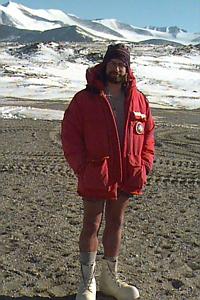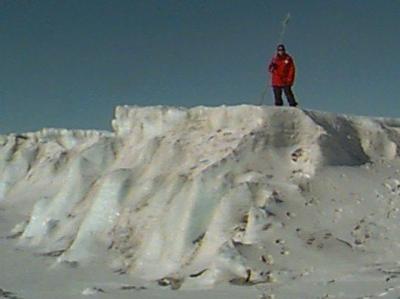29 October, 1996
Last night some weather moved in from the coast. The winds were blowing
from the north and we got a dusting of snow. Here cold winds originate from
the south and warmer moist winds from the north, just the opposite from New
England. Visibility had dropped to about one quarter mile; I couldn't see
the dive hut from camp. There was a drastic change in temperature; it got up
to 12oF, which seemed a bit like summer. At 8:30 I was completely exhausted
and laid down on my cot for a while. I woke up at 1:00 am and the
temperature had dropped to -10oF.
Everything seems to take a longer to accomplish here. Jim enjoys cooking
and prides himself on his abilities. He put together a great meal using the
ground beef that I brought in when I arrived. In general, everything he does
he does well.
Last night Chris was sick. Between diving and his other activities he
expends lots of energy and compensates by consuming enormous amounts of
food. He felt something he had eaten got to him. It was his turn to empty
the honey bucket but since he wasn't feeling well, I said I would do it.
When the outhouse box is full, its contents must be bagged, tagged, and
flown back to McMurdo for processing. It's not a pleasant job but the
Antarctic Convention prohibits adding foreign substances to the environment.
I asked Jim where the contents should be placed, when he told me, I thought
it strange that it was in a container where the frozen meat I brought in for
last nights supper was stored. When I arrived the day before, I left the
food supply next to the hut door. I didn't realize that Jim had replaced the
meat in the original container with the spoiled meat and left it next to the
other things that needed to be flown back to McMurdo for disposal. I had
given Chris a pound of spoiled meat for supper. Now I understand why Chris
was sick and you understand why I am happy to be a vegetarian.
In the afternoon Gamini and I went to an iceberg about three quarters of a
mile onto the sea ice. Most Antarctic glaciers discharge directly into the
sea where the ice breaks into icebergs. Erebus Glacier enters McMurdo Sound
off the Coast of Ross Island and the region is littered with numerous
icebergs that have frozen into the sea ice. Many are large enough to last
for several years before melting. Approximately 80 percent of an iceberg is
underwater. The block of ice that I am standing on in the picture was about
ten feet above the top of the sea ice that was also about ten feet thick.
That would mean the iceberg is 100 feet thick!


Contact the TEA in the field at
.
If you cannot connect through your browser, copy the
TEA's e-mail address in the "To:" line of
your favorite e-mail package.
|
